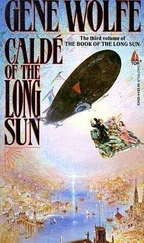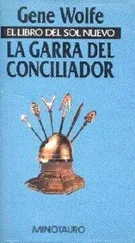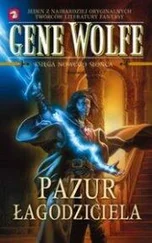Gene Wolfe - On Blue's waters
Здесь есть возможность читать онлайн «Gene Wolfe - On Blue's waters» весь текст электронной книги совершенно бесплатно (целиком полную версию без сокращений). В некоторых случаях можно слушать аудио, скачать через торрент в формате fb2 и присутствует краткое содержание. Год выпуска: 2000, ISBN: 2000, Издательство: Macmillan, Жанр: Фантастика и фэнтези, на английском языке. Описание произведения, (предисловие) а так же отзывы посетителей доступны на портале библиотеки ЛибКат.
- Название:On Blue's waters
- Автор:
- Издательство:Macmillan
- Жанр:
- Год:2000
- ISBN:9780312872571
- Рейтинг книги:4 / 5. Голосов: 1
-
Избранное:Добавить в избранное
- Отзывы:
-
Ваша оценка:
- 80
- 1
- 2
- 3
- 4
- 5
On Blue's waters: краткое содержание, описание и аннотация
Предлагаем к чтению аннотацию, описание, краткое содержание или предисловие (зависит от того, что написал сам автор книги «On Blue's waters»). Если вы не нашли необходимую информацию о книге — напишите в комментариях, мы постараемся отыскать её.
On Blue's waters — читать онлайн бесплатно полную книгу (весь текст) целиком
Ниже представлен текст книги, разбитый по страницам. Система сохранения места последней прочитанной страницы, позволяет с удобством читать онлайн бесплатно книгу «On Blue's waters», без необходимости каждый раз заново искать на чём Вы остановились. Поставьте закладку, и сможете в любой момент перейти на страницу, на которой закончили чтение.
Интервал:
Закладка:
But the important point is that I must not let myself get caught like that again. I must always have some means of relaying my orders immediately, or if not immediately as fast as possible.
I have sent for the armorer. He is to bring me a needier and several short swords, so that I can choose the one I like. We need slug guns and ammunition badly, but we have plenty of knives and swords at least.
As I penned that last, it struck me that I ought to send for the head gardener as well. I have been wondering how I could get a spade, and a bar of some kind to pry up the stones. He can supply them both, and it should be safer than having Evensong buy them for me in the market. I have seen him at work often, a silent old man with a faded blue headcloth and a big white mustache. Both the younger gardeners are away fighting, and he will be having a difficult time of it, poor old fellow. He should be eager to get on my good side.
This may be the most dangerous thing I have ever done. But I am going to do it. Not tonight, however, because the weather is clear and Green will light up everything. On the first dark night, I shall see how effectual Krait’s secret is. I will be confiding it to someone who knows it already, after all. That cannot be betrayal.
The town on the river consisted of twenty or thirty rough wooden houses and a hundred or so crude little huts covered with bark and hides. Nobody there would sell anything except on market day. I had never heard of such a custom, and went around complaining, and demanding things that I did not get. Eventually Krait and Seawrack persuaded me that it was better to be patient, to get to know the people and find out all we could. We ate Seawrack’s smoked meat, mostly, chopped and stewed with pepper and some local wild garlic I found, and drank river water before we found the little stream from which the people of the town got their own drinking water. I felt sure that the muddy river water would make us sick, but it did not.
The people looked like He-pen-sheep and She-pick-berry for the most part, lean and muscular with bandy legs, big shoulders, and noses like hawks. They all have long, straight hair, glossy black and really quite beautiful. All the women braid it; so do some of the men. Their complexions are dark yet translucent, so that the brown is touched with pink and red from the blood beneath; it can be very attractive, particularly in the children and the young women.
They are silent and suspicious in the presence of strangers, although the women seem to chatter incessantly when they are by themselves. Like She-pick-berry, they frequently pretended not to understand the Common Tongue. I was angry already (no doubt they saw it) and that made me angrier still.
Another traveler, also bound for Pajarocu he said, told me that the town (it was called Wichote) was the last outpost of civilization. I asked how he could be sure of that if he had gone no farther, and he claimed that he had gone much farther, together with a young man older than my son (by which he meant Krait) whom he had rescued at sea.
“He looked like you.” The traveler grinned. “But with more hair.”
Here I would like very much to be able to say that I knew at once, but it would not be true. I asked whether the young man he had rescued had known the way to Pajarocu.
“He thought he did,” the traveler said, “and got us lost a couple of thousand times.”
Thinking that the young man’s information might be of value, I asked to speak with him.
“He wouldn’t come back with me.” The traveler grinned again. “I wouldn’t worry about him, if I were you.”
“I won’t, if he’s not in Wichote; but I’d like to have a talk with him. You and he separated, up the river? How far was it?”
The traveler shrugged. “Two weeks’ travel, or about that.”
“You left him alone?”
“Sure. He’ll be all right. He’s a little raw at the edges, but you can’t break him. Or bend him very much, either. And he’s got a needier. He can take care of himself.”
We parted, and he must have gone back to his boat and put out, afraid that I would reach Pajarocu before him and take the last seat. (He was not on the lander, however.) After it occurred to me-very late-that the young man he had traveled with had certainly been Sinew, I was never able to find the traveler again, although I walked up and down those muddy little streets for hours and looked in at every open door, questioning everyone who would talk to me. When at last I accepted the fact that he had gone, I went back to the sloop, half minded to leave Seawrack ashore for the time being and go after him. But if I had caught up with him, and he had told me that the young man’s name had indeed been Sinew, what would I have learned? And what could I do when I had confirmed it, except continue searching for Pajarocu, which Sinew was searching for as well? We would meet in Pajarocu, wherever that was-or we would not meet at all.
Seawrack was ashore then, as I have said; we had not yet come to terms with the intractable necessity of waiting until market day, and she had taken a few of my silver trinkets in the hope of trading them for warmer and more durable clothing. I sat with Babbie in the stern of the sloop, thinking back upon the days when Sinew was small and looking at the big, slow river until shadelow. Now, if I shut my eyes, I see it still, a far larger and more sluggish river than our Nadi, with wide stretches of mud visible in many places. The setting of the Short Sun on Shadelow is never as dramatic as it is here.
I ought to have said the setting of the Short Sun as seen in and around New Viron-on the coast, in other words. Here the sun comes up out of the mountains late in the morning, and sets among mountains, too, briefly painting their snowy peaks with purple and flame (or is that the brush of Wijzer’s Maker?) and giving us a long twilight.
In New Viron, the Short Sun sinks into the sea, a wonderful sight when the weather is calm. Nettle used to make me go out onto the beach to watch it with her, and I was impatient much too often. I would give a great deal to stand beside her once more and hold her hand while we wait for the momentary flash of limpid emerald that appears as if by sorcery as the last fragment of the Short Sun vanishes behind the swelling waves, a green so pure that it cannot possibly have anything to do with the evil, festering whorl of that name. I, who never saw the sea until I was almost grown, did not come to love it until I left it. So, too, with Seawrack, or so I have reason to believe. The sea did not call to her while she lived in it as the-
I do not know what word to use.
The pet? The adopted daughter? The hook-studded lure of the old sea goddess? Very likely she was all three. Why should the sea call to her then? It had her. Only after she had left it, only when she was trying to put it behind her in that crude and dirty little village on the bank of the great river, did the sea sing to Seawrack as Seawrack herself sings to me tonight.
Up there I wrote that I could close my eyes and see the great river again. I can, and hear it again, too: the nearly stagnant water whispering as it slips past, the narrow little boat that holds only a single paddler, the mournful cries of the snake-necked seabirds (for there were still seabirds aplenty, although we were leagues from the sea), the rising mist, and the distant howl of a felwolf. The vast and empty flatness of it, so lonely and so desolate.
All that has vanished now. When I try to summon it again as I sit here between the lampstands, I see only Seawrack, the long, supple line of her legs, hips, and back.
Only the thrust of her pink-tipped breasts and the whiteness of her flesh, when first she left the sea.
The head gardener came yesterday after I had stopped writing. He was tired and so was I, yet we talked for over an hour. I believe I can trust him if I can trust anybody; and I have already resolved to trust Chota, so as to have somebody to keep watch. I might not be able to move the stone by myself, and might re-open the wound in my side if I try. Two of us should be able to move it pretty easily.
Читать дальшеИнтервал:
Закладка:
Похожие книги на «On Blue's waters»
Представляем Вашему вниманию похожие книги на «On Blue's waters» списком для выбора. Мы отобрали схожую по названию и смыслу литературу в надежде предоставить читателям больше вариантов отыскать новые, интересные, ещё непрочитанные произведения.
Обсуждение, отзывы о книге «On Blue's waters» и просто собственные мнения читателей. Оставьте ваши комментарии, напишите, что Вы думаете о произведении, его смысле или главных героях. Укажите что конкретно понравилось, а что нет, и почему Вы так считаете.











